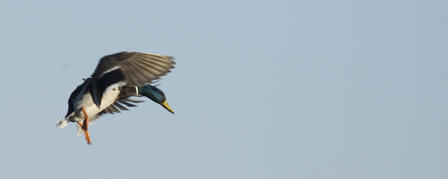YOUTH WATERFOWL, LATE-MIGRATING DUCK SEASONS FLYING IN

September 22, 2011
Despite dry weather, high duck numbers should draw hunters
PRATT — The summer of 2011 will be remembered in Kansas as one of the driest, hottest on record, and much of Kansas still needs rain this fall. However, high duck numbers will still provide hunters with options, and the early youth waterfowl seasons are just around the corner. Kansas Department of Wildlife, Parks and Tourism (KDWPT) staff at state waterfowl management areas are working hard to provide hunting opportunities, pumping available water into hunting pools.
As of Sept. 20, the following wildlife areas reported fair to good hunting conditions:
Northwest/Northcentral Kansas
Cedar Bluff — Fair
Glen Elder — Fair
Jamestown — Good
Norton — Fair
Wilson — Good
Northeast Kansas
Benedictine Bottoms — Good
Perry — Good
Tuttle Creek — Fair
Southwest Kansas
Cheyenne Bottoms — Good
Isabel — Fair
Texas Lake — Fair
Central Kansas
Council Grove — Fair
Southcentral Kansas
Elk City — Fair
Fall River — Good
Marais des Cygnes — Good
Melvern — Fair
Toronto — Good
Pomona — Fair
Quivira National Wildlife Refuge, near Stafford, reported that the only open water within the area’s hunting zones is in Units 10 and 11 in the Reno County section of the refuge.
Duck season dates and zones include the following:
- Youth High Plains Zone — Oct. 1-2;
- Youth Low Plains Early Zone — Oct. 1-2;
- Youth Low Plains Late Zone — Oct. 22-23;
- Youth Low Plains Southeast Zone — Oct. 22-23;
- High Plains Zone — Oct. 8-Jan. 2, 2012, and Jan. 21-29, 2012;
- Low Plains Early Zone — Oct.8-Dec.4, and Dec. 17-Jan. 1, 2012;
- Low Plains Late Zone — Oct. 29-Jan. 1, 2012, and Jan. 21-29, 2012; and
- Low Plains Southeast Zone — Nov. 5-Jan. 8, 2012, and Jan. 21-29, 2012.
The Low Plains Southeast Zone, roughly the southeastern one-quarter of the state, is new for 2011-2012 and should provide excellent late-season hunting in this part of the state.
During youth seasons, hunters 15 and younger may take ducks, geese, coots, and mergansers while hunting under the supervision of an adult 18 years or older. The adult may not hunt.
In both youth and regular seasons, six ducks is the daily bag limit, which may include no more than one canvasback, two redheads, two pintails, two scaup, three wood ducks, and five mallards (only two of which may be hens). The daily bag may comprise six of any other duck, such as six teal, six gadwall, or six wigeon.
Depending on rainfall, good hunting may be found in many other areas of the state, both public and private. For weekly updates on public waterfowl management areas, visit the KDWPT website, www.kdwpt.state.ks.us, and click “Hunting/Migratory Birds/ Waterfowl Reports."
For a detailed map of the duck zone boundaries and other regulations, pick up a copy of the 2011 Kansas Hunting and Furharvesting Regulations Summary, available at all Kansas Wildlife, Parks and Tourism offices and most license vendors, or download the booklet from the KDWPT website.
-30-









